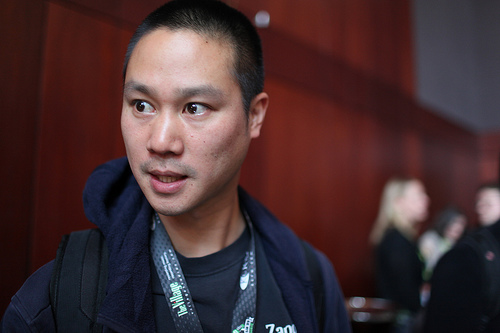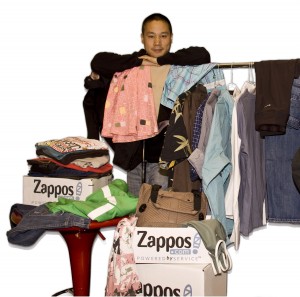Not Your Ordinary Shoe Salesman: How Corporate Culture Sells More Than a Billion Dollars of Shoes A Year
By Nick Nanton Branding Consultant and Celebrity Lawyer
Zappos CEO Tony Hsieh is focused on Zappos’ ultimate goal of being “a customer service company that just happens to sell shoes.” Although he focuses on customer service, he isn’t half bad at selling shoes either — taking Zappos to a new height of more than $1 billion in sales in 2008. But Tony is no rookie to big numbers or success. The Harvard grad sold his first company to Microsoft in 1998 for $265 million. I have connected with Tony several times and love his insight and the style his uses to direct his rapidly growing empire at Zappos, so I asked if I could interview him to show you a deeper look inside the belly of a billion dollar CEO’s mind. I hope you enjoy what he had to say as much as I did and that you’ll see how his strategies can be put to use in any business, big or small.

Nick: I’ve kind of heard the story about how you heard about Zappos, but I’d love to hear it directly from you, if you don’t mind, just because I think there’s a lot of good lessons we can pull out of it. Do you mind telling us how you found out about Zappos, and how you got involved?
Tony: Sure. Alfred, who’s now our CFO and COO, he and I got together and formed an investment fund, and we invested in about 20 or so different Internet companies and Zappos just happened to be one of them. The founder called us up, left a voicemail, and said he had this idea about selling shoes online. At first we had the same reaction as everyone else, which was, “That’ll never work.” It sounded like the poster child for bad Internet ideas.
And actually we weren’t planning on following-up, but then he quoted one figure, which was that, at the time, five percent of all footwear sales in the U.S., about two billion dollars a year, was being done by mail-order paper catalogs. So, we thought at the very least that two billion was going to move online and possibly there was the opportunity of it expanding beyond that as well.
Nick: I’ve heard a quote from you about Zappos being a service company that just happens to sell shoes. Obviously, you’re going way beyond that now. I’d love you to talk about that for a second because most people get caught up and think, “If I’m a widget maker, I make widgets, and that’s what I do.”
Tony: Well, my advice for any business or entrepreneur is whatever you’re doing, just think bigger. There is always a bigger vision than whatever it is that you’re doing. So take the railroads, for example, they were a great business at one point, and then cars came along, airplanes came along and now they’re not such a great business.
Part of the problem was they thought of themselves as being in the train business, whereas if they thought of themselves as being in the transportation business then they would probably be much better off and would’ve thought beyond just railroad tracks. Similarly for us, we actually started out just thinking we were in the shoes business, online shoe retail, and then we sat around one day and we thought, okay, the bigger vision would be customer service. If we build the Zappos brand around the very best customer service, then we’re not limiting ourselves to just shoes.
 Today, we have a huge selection of clothing online and we’re making a big push into that. But 10, 20, 30 years from now it doesn’t even have to be online. There could be a Zappos airlines, that’s just about the very best customer service. So, I encourage all entrepreneurs and businesses to really think about how you expand the vision without necessarily giving up what you’re good at. If you’re a widget maker, and you make the best of whatever widget out there, I’m not saying walk away from that, but just think bigger and beyond just what your original idea was. And the cool thing is there’s always room to expand.
Today, we have a huge selection of clothing online and we’re making a big push into that. But 10, 20, 30 years from now it doesn’t even have to be online. There could be a Zappos airlines, that’s just about the very best customer service. So, I encourage all entrepreneurs and businesses to really think about how you expand the vision without necessarily giving up what you’re good at. If you’re a widget maker, and you make the best of whatever widget out there, I’m not saying walk away from that, but just think bigger and beyond just what your original idea was. And the cool thing is there’s always room to expand.
Nick: Absolutely. And can you talk for a minute about some of the customer service things you’ve done? Because everybody likes to say, “We have great customer service,” but it’s not usually well executed.
Tony: I think most businesses probably just don’t care about customer service period. But then, even for the ones that do, they go about it in a very process-and-procedure way. What I mean is that they make sure, for example, to say the person’s name three times or when you greet them say, “Sir” or whatever. And basically it comes down to basically developing a series of scripts, which is okay, but it’s like talking to a machine.
Nick: Yeah, you’re creating robots.
Tony: Yeah and then the person, the customer service rep, is basically just reading lines. And so they’re not very engaged or passionate about actually giving service. Our approach is no scripts and not to measure efficiency in terms of the call times, which is how most call centers are run. Instead, we focus on the culture and make sure everyone in the company understands our long-term vision about building a Zappos brand to be about the very best customer service. We make sure to give them the proper training to use all the tools and so on. But then leave it up to them to just be real and genuine and passionate when they’re actually talking to customers. They know the goal when a customer hangs up is for the customer to walk away thinking, “Wow, that was the best customer service I’ve ever had.” It’s really about creating that environment and culture and making sure you get people who are inherently passionate about customer service and actually want to deliver great service as opposed to people who are just there for a paycheck.
Nick: I know I’ve been very impressed when I’ve ordered stuff. It’s awesome because of the whole concept of free overnight shipping to my door and back if I don’t like it. I can test out anything I want. You guys just take it back, no questions asked, free shipping — you even give me the return label. That’s customer service. Because I feel well served as a customer so much so that it’s easier for me to go online and buy a few pairs of shoes, and I usually end up keeping more than I think I’m going to, which I’m sure is a common occurrence.
Tony: We actually take most of the money that we would’ve spent on paid marketing or paid advertising and put it into the customer experience. So whether it’s the things you talked about, like the shipping back and forth, running our warehouse 24/7, or running our call center 24/7 — all of those things are very expensive. But we really think of those as our marketing dollars and let our customers basically do the marketing for us through word of mouth and their loyalty.
 On any given day about 75 percent of our orders are from repeat customers, and I think a lot of businesses focus too much on thinking about, “How do I market to get new customers?” If there’s already existing customers, and if you just treat them really well and make sure that you’re doing something that’s unique and memorable and makes them happy, then they’ll come back and do your marketing for you.
On any given day about 75 percent of our orders are from repeat customers, and I think a lot of businesses focus too much on thinking about, “How do I market to get new customers?” If there’s already existing customers, and if you just treat them really well and make sure that you’re doing something that’s unique and memorable and makes them happy, then they’ll come back and do your marketing for you.
Nick: I absolutely agree, and we talked with our clients all the time that there are really only three main ways to grow your business. One is to get more new customers. Two is to get your existing customers to spend more per transaction, and three is to get them to spend more frequently. Of all the things, getting new customers is absolutely the hardest, but the one that’s focused on the most.
Tony: Yeah, and I think there’s something maybe exciting or sexier about trying to get new customers. But the money’s in the repeat customers.
Nick: Well said. I’ve read a few things about your hiring process, how long the training is and that you actually pay people to quit. Can you tell us about that?
Tony: Yeah, so we actually do two sets of interviews for everyone we hire to work at our headquarters here in Las Vegas. The hiring manager and his/her team interview for the standard experience, technical ability and so on. But then our HR department does a separate set of interviews purely for a cultural fit, and they have to pass both in order to be hired. So we’ve actually passed on a lot of really smart, talented people that we know can make an immediate impact on our top or bottom line, but if they’re not a culture fit we won’t hire them.
And the reverse is true as well. We’ll fire people if they’re bad for the culture, even if they’re doing their specific job function perfectly fine. And as far as the training goes, everyone hired goes through the same training that our call center reps go through. It is four weeks long, and we go over company history, our philosophy about customer service and points of company culture. And then they are actually on the phone for two weeks taking calls from customers. After that you start the job that you’re actually hired to do.
During that training process, at the end of the first week, we make an offer. The offer is that we’ll pay you $2,000 to leave the company. And that’s a standing offer until the end of the training. The reason for that is because we don’t people who are here just for a paycheck.
Nick: I understand you actually publish a “culture book” about the culture of working at Zappos. Can you tell us a little bit about that?
Tony: Yeah it’s a book we put out once a year. We ask all of our employees to write a few paragraphs about what the Zappos culture means to them, and, except for typos, it’s unedited. So you get to read both the good and bad. It’s organized by department, so you can tell the difference between the different subcultures of different departments. And I guess the way to think about it is — you know how on websites there are customer reviews? These are basically kind of like employee reviews of the company. And we give it to prospective job candidates and even customers, vendors and business partners, just so people can get a pretty good sense of what our culture is like.
Nick: What I love is that you’ve created this culture internally and externally. You share a bunch things with your suppliers and clients. It’s really a very transparent way of operating, which makes a lot of sense because with the Internet these days, you really can’t hide from anything anyway. Talk about that a little bit if you don’t mind.
Tony: Well one of our core values is about being as open and honest and as transparent as possible. So we do that with our employees. We share lots of data with our vendors and we have tours that come through everyday. They spend a full day or sometimes two days with us and they’re listening on calls and see how we score them or spend a few hours with our recruiting team and we share the actual interview questions we ask and so on.
So were very open with everything, and, in fact, we’ve actually even developed a subscription service out of it for $40 a month at ZapposInsights.com. We share everything by video. You can download the answers to questions that have already been asked or ask any question you have. Then we get the best person at Zappos to answer it. So if it’s a recruiting question, we’ll get the head of recruiting to answer it, put it on video, transcribe it and then not only are we answering your question but it’s made available to everyone else. So over time we’re building up a library and a collection of videos that share anything that people want to learn about how we do things.
Nick: One thing I thought was cool about this whole culture thing is that you made a comment that the telephone is one of the best branding devices, and I love that statement. As I often tell clients, they’ll email something back and forth, but people can’t read tone. They’ll spend five hours emailing something that could’ve taken three minutes on a phone if they would just pick up the phone and call somebody.
Tony: Ultimately, I think it comes down to the fact that people want to do business with people they feel connected to. And that’s why most people, all other things being equal, if they’re friendly with the neighborhood butcher then they’d rather buy from him or the guy that owns the convenience store down the street if he’s your friend versus going to some big chain.
Now the problem is that usually the bigger chains offer lower prices and so on. So the small town merchant doesn’t always win, but what people want is that personal, emotional connection to whomever they’re doing business with. That’s why we value the telephone so much, because it is personal.
Nick: That’s another reason you don’t use scripts, right?
Tony: Right. You might call once and get a rep who’s really chatty and loves to tell jokes, and then you might call another time and it’s a different rep who says he hears your dog barking in the background, and he tells you he is a dog lover and then you guys bond over that. And so, that’s really our approach — just trying to humanize our brand and the company as much as possible, because that’s ultimately who we are.
Nick: Somewhere in your big stack of mail there, I actually sent you a copy of my book called Celebrity Branding You, and the first line in the book is “People buy people.” And that’s the concept we base all of our consulting and coaching on. We help build, as we call it, celebrity-branded businesses as we turn business people into celebrities. Utilizing personality-driven marketing, we are able to build loyal fan bases that spend more money on the products and services our clients offer, because ultimately there’s only one choice in their mind — the person they have the relationship with. And we use a lot of technology, to build a personal relationship, which leads to my next question.
From what I understand, you encourage your employees to be on Twitter. Can you talk a little bit about your thoughts on social media and maybe how you utilize it in order to build business?
Tony: Yeah. I personally dislike the term “social media” because people, most businesses or marketers, try to think of it like, “How do I use this as a marketing vehicle? How do I have it translate directly into sales?” And that’s not really our approach. Our approach really is that if there’s a tool out there that enables us to build more personal, emotional connections with people and potential customers, then we should use it. The telephone falls into that category; Twitter falls into that category. We actually have a fan page on Facebook, and we have blogs if you go to Blogs.Zappos.com.
But whether it’s Twitter, Facebook, our blogs or the videos, it’s not about how we leverage these for sales. It is how we use them to connect on a more personal level with our customers. I guess the way I think about it is, the pay off is going to be at least two or three years down the line. The same way the pay off with customer service is going to be two or three years time down the line. We’re not trying to drive immediate sales.
Nick: Very cool. Well, I appreciate your time.
Tony: Oh, actually one more thing, if any of your readers want a copy of our culture book we’re happy to send that out for free. It’s a physical book, so just send an email with your physical mailing address to CEO@Zappos.com.
Nick: Wow – that’s great. Thanks so much Tony.
Tony: Take care.
Nick: You, too.
Related Post: What Makes a Good CEO From a CEO POV







